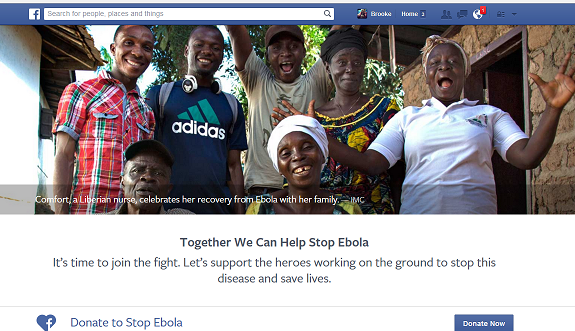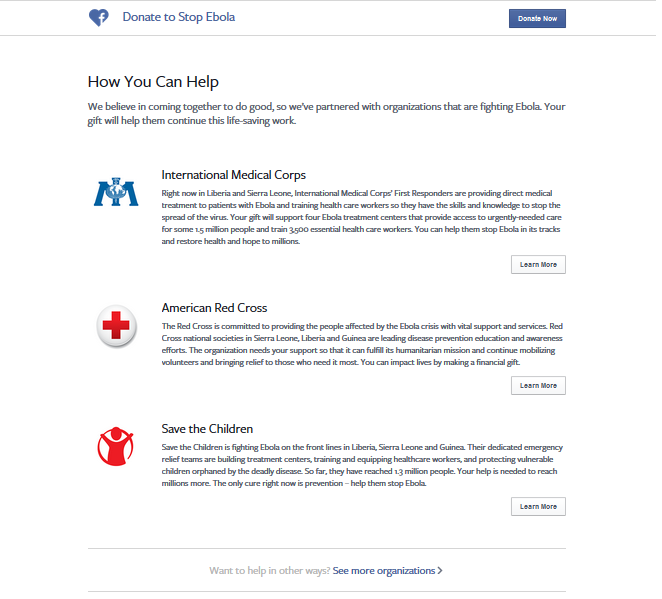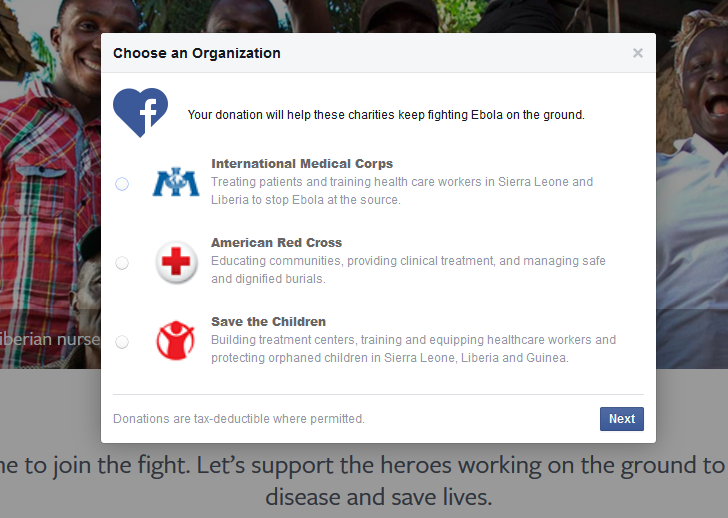1.8 billion – that is the number of people on Facebook globally. Every day, at least once, half of those 1.8 billion log on to do everything from share baby’s first steps to find out “What Game of Thrones” character they are. What if we could do more with that collective? What if we could eradicate disease?
For years, I have touted the power of Facebook and yet spoken out about what I feel has been a very big issue with Facebook’s growing business model. A feeling that many of us in the nonprofit community have – Facebook’s desire to please investors with advertising revenue has punished nonprofits’ ability to reach their supporters on communities they’ve spent years cultivating. Today, as I sit in my local coffee shop and do what I do every morning- open Facebook, I noticed something that might signal a potential shifting of the winds. Could Facebook finally realize the power of its own platform to do good? Or is this a test for the masses? Is Facebook checking to see if users really want to do good through their platform?
Visibility of the Ebola Issue:
You can’t get better placement of your call to action that at the very top of a Facebook News Feed. Here’s the call to action (CTA):
The “Learn More” goes to an incredibly well done landing page within Facebook with a vanity url.
Two things I immediately appreciate about the above CTA:
- They ask you to donate – It seems simple, but ask any nonprofit about how they feel when asking people for money and I bet half of them will squirm out of their seats – unless, of course, you work for a political campaign.
- They offer to educate – with 1.8 billion users, there are probably a few here and there that are not educated on the true facts of Ebola, the disease as a threatening pandemic and what the average individual can do to help. With American news outlets covering the rush to put our children in plastic bubbles and construct our fully equipped bug-out bunkers, the facts tend to be left behind.
A Clean and Simple Landing Page:
Just as with any good nonprofit website, this landing page is simple, clean, to the point. No more than two calls to action: Donate and Learn More.
Three Big Nonprofits:
We all know there are hundreds of charities supporting efforts on the ground in Africa, but giving a new donor more than three options would be messy and a turn off. They had to select organizations with notoriety, a good reputation among donor watchdog groups and a Facebook presence large enough to support additional outreach. They also had to select the groups that will actually do the work on the ground in West Africa.
The “more information” section at the bottom of the page links to a third party organization with and additional list of vetted nonprofits:
This is a good move as well as it helps introduce the 1.8 billion to those groups doing good work.
Donation experience:
If you have a credit card on file, presumably for leveling up on Candy Crush, then the donation process is seamless. For those concerned about giving through Facebook as a platform, I can tell you that there is risk in any online transaction – just as there is a risk of walking around the subway with $100 bills shoved in your pocket. In today’s world, ease of donation is the key. In fact, I would say it is imperative.
Millennials and my fellow Gen-Xers, we want to donate in less than 3 clicks and easily share how awesome we are for giving instantly. We sure as hell don’t want to send a check in the mail. Checks are for grandmas and for validating bank account information for your direct deposit. With that said, grandma isn’t writing as many checks either. The fastest growing user base on Facebook is 55+ and they are also the fastest growing population of online donors. It’s just a hunch, but I bet they are probably not likely to give through a third party such as Facebook, but the option to donate online through the charity website is still available here in this campaign. If the charity is sophisticated enough, they will be able to see where the donation traffic came from and will be more likely to share the good news on Facebook in return.
A Win Win Win for Humanity:
So what now, Facebook? We raise enough money to eradicate Ebola in West Africa and save the world. What then? My suggestion? Pull a page from the Charity: Water manual and show everyone exactly how your efforts saved lives. Follow the donations. Follow the stories on the ground. Follow up! Use this as your next big thing – you can now be THE convener of charities, a voice for the people in need and a platform to engage the public. Use this as a way to show those noisy pundits at Tech Crunch and Fast Company that you indeed are still relevant. You can be the vehicle in which our society will elevate people from poverty, allowing them to then participate in the circle of good works. More importantly, you can thumb your nose at the investors that say 65% increase in revenue isn’t good enough because now you are literally saving lives and there’s actual proof. So, thank you for making a difference, Facebook, but keep it up and follow through and this effort will be a “win” in my book.
A Win for those suffering from Ebola.
A Win for charities hoping to make a difference in the world.
A Win for the continued relevance of Facebook.
Contact us for more information about how we can help your nonprofit connect the dots on social media.
- Previous Post Reed Smith Achieves Social Media Platinum Status
- Next Post When was the last time you Penned (not Pinned)?




